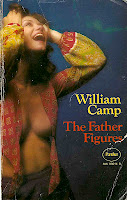Here at the Lost Book Library, I endeavour to at least try and read all the books featured at some point. This is of course a time-consuming exercise, so the fact that many of the books are quite obviously unreadable and can therefore be guiltlessly abandoned a couple of chapters in is fortunate.
Here I present a summary of my efforts to read the first five books featured.
The Father Figures by William Camp
Status: Abandoned, p. 35
This tale of infidelity in the suburbs of early seventies Britain failed to grab me. In fact, the only thing I found to be of interest was the detail that one of the characters ran a cannery that employed students in the summer months, who failed to take the job seriously. 'Yes,' I thought, 'it is hard to get students to take their summer jobs seriously. I have observed this in real life.' Other than that, however, I couldn't bring myself to care less about what was going on, and when I realized I had lost all track of which character was which, and who was sleeping with who, I knew it was time to stop. Having said that, I get regular search engine hits for this book, so it obviously still means something to somebody.
The Apparition by Ramona Stewart
Status: Abandoned, p. 32
I really wanted to like this story, containing as it does an experimental filmmaker with an entourage seemingly modelled on Andy Warhol's Factory, cursed archeological artifacts, and general Jungian weirdness, but Stewart's perfunctory prose style just isn't up to communicating her ideas. I was worn down by the sense of a writer hopelessly overreaching, and so abandoned the book with gay abandon. (Question: Why is Patsy Kensit on the cover?)
The Boy From Space by Friedrich Feld
Status: Completed
This Austrian children's sci-fi book from 1957 is something of a gem. A giant child from space lands in a town, and the adults are afraid his headstrong manner will be a bad influence on their children. The adults, meanwhile, are soon setting less than a good example themselves as they are taken over by greed, scientific curiousity and Cold War paranoia. There are some beautiful touches, such as the child being afraid of the Moon (his planet not having one, presumably), and there's also a startlingly accurate description of a mobile phone ('When you want to call anyone, you just take it out of your pocket, get the number and speak.'). There are some superb illustrations by Derek Lucas, meanwhile (see below).

Status: Um...
This is really more for dipping into than reading from beginning to end. Also, I seem to have lost it.
Muscle Beach Party by Elsie Lee
Status: Completed
I'd actually read this novelization of the sixties teen movie before I'd started the Library. Not so much entertaining, more fascinating in the way Lee manages to produce a coherent piece of narrative prose, despite having a knockabout comedy filled with sight-gags and musical numbers as her source material.
Another round-up soon, once I've read a few more books, or failed to.















